- Home
- David Downing
Zoo Stationee Page 29
Zoo Stationee Read online
Page 29
They would be in no position to write.
Exactly.
Russell sighed. Well, thank you anyway, he said, just as the girls came back with a box of assorted cream cakes. They insisted on Russell having the first pick, then sat round the table happily licking the excess cream from their lips. When he suggested driving them to the station the next day, he could see how relieved Frau Wiesner was, and cursed himself for not putting her mind at rest at sooner. How else could they have gotten there? Jews were not allowed to drive, and most cabdrivers wouldnt carry them. Which left public transport, and a fair likelihood of public abuse from their fellow passengers. Not the nicest way to say goodbye.
The train, she said, was at 11:00, and he was back the next morning at 9:30. The girls squeezed into the back with their small bags, Frau Wiesner in the front with a suitcase on her lap, and as they drove down Neue Konigstrasse toward the city center Russell could feel all three of them craning their necks and filling their memories with the sights of their disappearing home.
Effi was waiting at the Zoo Station entrance, and all five of them walked up to the westbound express platform. A pale sun was shining, and they stood in a little knot waiting for the train to arrive.
You didnt tell me Albert was going to Palestine, Russell said to Eva Wiesner.
I should have, she admitted. Distrust becomes a habit, Im afraid.
And you? he asked.
I dont know. The girls prefer England. The clothes are better. And the movie stars.
Youll come see us in England? Marthe asked him in English.
I certainly will.
And you as well, Marthe told Effi in German.
Id love to.
The Hook of Holland train steamed in, hissing and squealing its way to a stop on the crowded platform. Russell carried Eva Wiesners suitcase onto the train, and found their assigned seats. Much to his relief, there were no Stars of David scrawled on the girls seatbacks. Once the three of them were settled he went in search of the car attendant, and found him in the vestibule. Look after those three, he said, pointing them out and wedging a five hundred Reichsmark note in the mans outside pocket.
The attendant looked at the Wiesners again, probably to reassure himself that they werent Jews. Fortunately, Eva Wiesner looked as Aryan as anyone on the train.
Russell rejoined Effi on the platform. The signals were off, the train almost ready to go. A piercing shriek from the locomotives whistle brought an answering scream from an animal in the adjoining zoo, and the train jerked into motion. The girls waved, Eva Wiesner smiled, and they were gone. Russell and Effi stood arm in arm, watching the long train as it rumbled across the iron bridge and leaned into the long curve beyond. Remember this moment, Russell told himself. This was what it was for.
AFTER A QUICK LUNCH with Effi in the Uhlandeck Café he set off for Kiel. The Berlin-Hamburg autobahn was still under construction, which left him with the old road through Schwerin and Lubeck, around 350 kilometers of two-lane highway across the barely undulating landscape of the North German plain. After three hours of this he began to wonder whether the train would have been better. The car had seemed a safer bet, but only, he realized, because he had fallen for the juvenile notion that it made escape seem more feasible. In reality, he had about as much chance of outrunning the Gestapo in the Hanomag as an Aryan sprinter had of outrunning Jesse Owens.
He arrived in Kiel soon after dark, stopped at the railway station to buy a town guide at one of the kiosks, and studied it over a beer in the station buffet. Kiel itself stretched north along the western shore of a widening bay which eventually opened into the Baltic. Gaarden was on the other side of the bay, accessible by steam ferry or a tram ride around its southern end.
Russell decided to look for a hotel near the stationnothing too posh, nothing too seedy, and full of single businessmen leading relatively innocent lives. The Europäischer Hof, on the road which ran alongside the station, met the first two requirements, and on a busy day might have met the third. As it was, several lines of hopeful keys suggested the hotel was half empty, and when Russell asked for a room the receptionist seemed almost bemused by the scope for choice. They settled on a second floor room at the front, which looked out across the glass roof of the station, and the seagull colony which had been founded on it.
The hotel restaurant showed no signs of opening, so Russell walked north down the impressive Holstenstrasse and found an establishment with a decent selection of seafood. After eating he walked east in the general direction of the harbor, and found himself at the embarkation point for the Gaarden ferry. The ferry itself had left a few seconds earlier and was churning across the dark waters toward the line of lights on the far side, some half a kilometer away. Looking left, up the rapidly widening bay, Russell could see what looked like a large warship anchored in midstream.
He stood there for several minutes enjoying the view, until the icy wind became too much for his coat to cope with. Back at the hotel he had a nightcap in an otherwise deserted bar, went to bed, and fell asleep with surprising ease.
He woke early, though, and found that the Europäischer Hof considered breakfast an unnecessary luxury. There were, however, plenty of workingmens cafés selling hot rolls and coffee around the station. By eight he was driving through the town center, heading for the northern suburb of Wik, where the main harbor for merchant ships was situated. He had already finished his article on German sailors, but the Gestapo werent to know that, and he needed an honest reason for being in Kiel. Over the next couple of hours he talked to sailors in the cafés on the Wik waterfront, before moving on to the eastern end of the Kiel Canal, which lay just beyond. There he watched a Swedish freighter pass through the double locks which protected the canal from tidal changes, chatting all the while with an old man who used to work there, and who still came to watch. Driving back along the western shore of the haven Russell got a better view of the warship hed seen the night before. It was the recently commissioned Scharnhorst, and its guns were lowered toward the deck, as if apologizing for their existence. Two U-boats were tied up alongside.
He wasnt hungry but had lunch anyway, along with a couple of beers to calm his nerves, before following the tracks of the Wellingdorf tram through Gaarden. The Germania Bar wasnt hard to spotas Gert had said, it was almost opposite the main gate of the Deutsch Werke shipyardand there was no shortage of places to leave the car. The bar itself was on the ground floor of a four-storey building, and seemed remarkably quiet for a lunch hour. He drove another few hundred meters toward Wellingdorf before turning and retracing the route back to Kiel.
With Pauls birthday in mind, he spent the rest of the afternoon looking round the shops in the town center. The two toy emporiums he found were uninspiring, and hed almost given up when he came across a small nautical shop in one of the narrower side streets. Pride of place in the window display had been given to a model of the Preussen which, as Paul had once told him, was the only sailing ship ever built with square sails on five masts. The price made him wince, but the model, on closer inspection, looked even better than it had in the window. Paul would love it.
Russell carefully carried the glass case back to the car, did his best to immobilize it in the back, and covered it with the small rug hed bought for Effis use on Rügen Island. He checked his watchanother five hours until his appointment at the Germania Barand went back to the Europäischer Hof, hoping to wile the time away with a nap. Despite the unexpected bonus of a hot bath, he found sleep impossible, and just lay on the bed watching the room grow darker. Around five oclock he turned on the lights and expanded the notes hed made that morning.
At seven he walked across to the station for something to eat and another beer, eschewing a second with some difficulty. The concourse was full of boisterous sailors in Scharnhorst caps, presumably going on leave.
Back at the hotel, he collected his suitcase,
handed in his key, and walked out to the Hanomag. As he headed for Gaarden the road seemed empty, but Gaarden itself was getting ready for Friday night, the open doorways of numerous bars and restaurants spilling light across the cobbled street and tramlines. There were a lot of sailors in evidence, a lot of women awaiting their pleasure, but no sign of the police.
He parked up against the shipyard wall and sat for a minute, examining the Germania Bar. Conversation and laughter drifted out through the open door, along with a smell of fried onions. Light edged the closed curtains in all but one of the upstairs windows; in the darkened exception a man could be seen leaning out, a cigarette bobbing between his lips. It was a brothel, Russell realized. And it was three minutes to eight.
Heart in mouth, he climbed out of the Hanomag, checked it was locked, and waited for a tram to pass before crossing the road. The bar was bigger inside than the outside suggested, with two walls of booths, a few tables and a small area for dancing should anyone feel the need. It was plusher than hed expected, and cleaner. The booths were bound in leather, the bar itself highly polished. There were several young sailors to be seen, but most of the men, like Russell, were either entering or enjoying middle age inside their respectable overcoats. He took his off, seated himself in one of the two remaining empty booths, and laid Martin Chuzzlewit face up on the table.
Good book? the waitress asked him. Chuzzlewit, she said with a laugh, what sort of name is that?
English, he told her.
That explains it. What would you like?
He ordered a Goldwasser, and looked around the room. A few faces had looked his way when he entered, but no one had shown any obvious interest since. One of the sailors stood up, playfully pulled his female companion to her feet, and headed for a door in the back wall. As it opened, the bottom of a staircase came into view.
The Goldwasser arrived, and a female companion shortly thereafter. She was about his age, thin verging on scrawny, with dark-circled eyes and a tired smile. Buy me a drink, Herr Russell, she suggested in a low voice, before he could say he was waiting for someone else. She leaned across the table, put a hand over his, and whispered: After weve had a drink well go upstairs, and youll get what you came for.
He ordered her drink, a sweet martini.
I am Geli, she said, stroking his hand with an absentminded air. And what are you doing in Kiel?
Im a journalist, he said, joining the charade. Im writing a story about the widening of the Kiel Canal.
Extra width is always good, she said wryly. Lets go up. I can see youre impatient.
He followed her up two flights of stairs, watching the hem of her red dress swish against her black-stockinged calves. There were four rooms on the second floor, and pleasure was being noisily taken in at least one of them. Through the open door of a bathroom he caught sight of a plump blond wearing only black stockings and a garter belt, drying herself with a towel.
In here, Geli said, opening a door and gesturing him in. Ill be back in a few minutes, she added, closing it behind him.
There was a window that overlooked an alley, and a threadbare carpet that covered half the wooden floor. A bare light bulb illuminated a large unmade bed which was supported in one corner by a pile of books. On the beds wooden headboard someone had written Goebbels was here, and someone else had added So thats how I got this disease. Enough to put anyone off, Russell thought.
The door opened and a man came in, closely followed by Geli. He was younger than her, but not by much. He had fair hair, blue eyes, and skin which had seen too much sun and wind. He was wearing a sailors greatcoat.
He shook Russells hand, and sat down heavily on the bed, causing it to creak alarmingly. Geli stood with her back to the window, half-sitting on the sill, watching him unpick the seam of his coat lining with a penknife. It only took a few seconds. Reaching inside he pulled out a small sheaf of papers and handed them over to Russell.
It looked like a small sheaf, but there were more than thirty sheets of text and diagrams, all copied out onto the thinnest available paper. These are not the originals, Russell thought out loud.
If they were, the Navy would know they were gone, the man said wearily, as if he was explaining matters to a particularly obtuse child.
Are there other copies? Russell asked.
One. For your successor, should you fail.
And then youll need another one for his successor.
The man offered him a grudging smile. Something like that.
Can I ask you a question?
Go ahead.
Why not send this out by radio?
The man nodded at the papers. Look at it. By the time we got that lot out every triangulation van in Germany would be banging on our door. And you cant convey maps by radio, not with any ease. He offered a fleeting smile. We used to post stuff to the Soviet Embassy in Berlin, but they got wise. They open everything now. Everything.
Russell folded the papers in two and stuffed them into his inside pocket. I have a better hiding place in my car, he explained.
Thank God for that. Look, I must go before. . . .
There was a sudden roar from below. The stormtroopers have arrived, Geli said. Dont worry, she told Russell, theyre not here for you.
They fuck our women, fuck our country, and soon theyll be fucking all of Europe, the man said. But well have them in the end. He shook Russells hand again and wished him good luck. Ill see you later, he told Geli, and slipped out of the door.
Just wait a few minutes, she told Russell, and Ill take you down.
They were long minutes, but they eventually passed. As they went down a stormtrooper was coming up, almost dragging a girl in his wake. Slow down, Klaus, Geli pleaded with him. Shell be no use to you unconscious. He grinned at her, as if the girls consciousness were neither here nor there.
The noise from the bar had grown deafening. The back door might be better, Geli said, and led him out through a bright but empty kitchen. Just right and right again, she said, and closed the door behind him, removing most of the light. Russell felt his way along the back wall to the buildings corner, from where he could make out the dimly lit road. As he started down the side of the building a silhouette loomed in the mouth of the alley, a man in high boots, with cap on head.
Russell froze, heart thumping in his chest. The man was moving toward him, reaching for something with his hand. . . .
His trouser buttons. A couple of meters into the alley he turned, pulled out his penis and, with a loud exhalation, arced a fierce stream of dull golden piss against the wall. Russell stood there, petrified of any movement, wondering when it would ever end. A ship in the bay sounded a long and mournful blow on its horn, but still the piss streamed out, forcing the man to shift his feet away from the spreading lake.
The arc finally collapsed. The stormtrooper gave a few pumps for luck, stuffed himself back into his trousers, and headed for the alley entrance. And then he was gone.
Russell hurried forward, hoping to escape before someone else had the same idea. He almost stepped in the prodigious puddle, but reached the entrance without mishap. His car was sitting across the road, hopelessly sandwiched between the two open trucks which had brought the stormtroopers.
He hurried across, climbed in, and started the engine. Five or six maneuvers later, he was still only halfway out. The temptation to ram the trucks was almost overwhelming, but he doubted whether the Hanomag had the weight to move them if he did. Fighting back desperation, he shifted the car, inch by inch, further into the road. He was almost there when several stormtroopers emerged from the door across the road and started shouting at him. He was about to try a final, metal-scraping, lunge for freedom when he realized they were killing themselves with laughter. They had hemmed him in as a practical joke.
He opened t
he window and made a wry face, acknowledging their brilliant sense of humor. Three more maneuvers and he was free, Uturning the Hanomag in front of them with a triumphant raise of the hand. As he headed south toward the center of Gaarden he could see them happily waving goodbye in his rearview mirror.
His hotel bed was waiting for him, but it didnt seem far enough away. He wanted, he realized, to get out Kiel, and as quickly as possible. It was still only 9:00, time enough to find a small guesthouse in a small town, somewhere between there and Lubeck.
He took the more northerly of the Lubeck roads, and once in open country found a wide verge on which to pull over. With ears alert for approaching traffic he turned on the car light, opened up the false bottom of the suitcase, and placed the papers inside. He had planned to copy them for the British that night, but hed need a whole weekend to copy this lot. He would have to be selective. Theyd be none the wiser.
About ten kilometers further on he found the town and guesthouse for which he was looking. It wasnt much more than a village bar, but the woman who ran it was happy to provide him with a room. It was my sons, she said, without explaining where hed gone. The sundry toys and books suggested he was expected back.

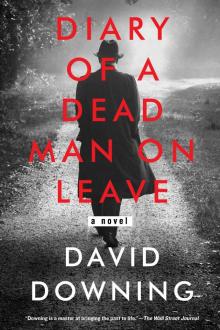 Diary of a Dead Man on Leave
Diary of a Dead Man on Leave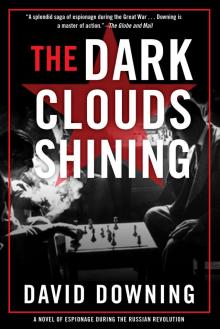 The Dark Clouds Shining
The Dark Clouds Shining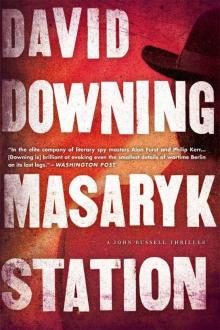 Masaryk Station (John Russell)
Masaryk Station (John Russell)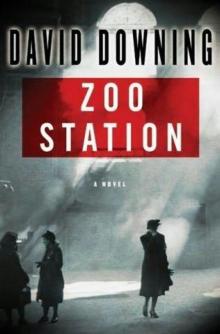 Zoo Stationee
Zoo Stationee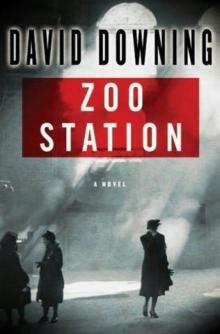 Zoo Station jr-1
Zoo Station jr-1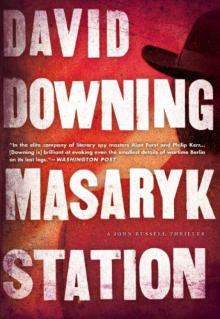 Masaryk Station
Masaryk Station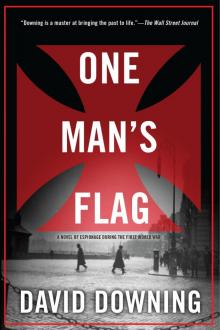 One Man's Flag
One Man's Flag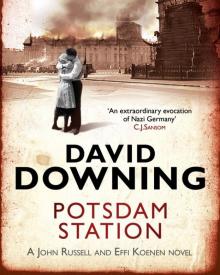 Potsdam Station jr-4
Potsdam Station jr-4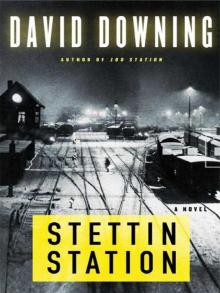 Stattin Station jr-3
Stattin Station jr-3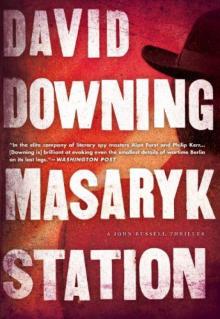 Masaryk Station jr-6
Masaryk Station jr-6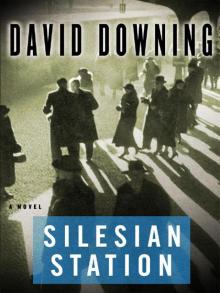 Silesian Station (2008) jr-2
Silesian Station (2008) jr-2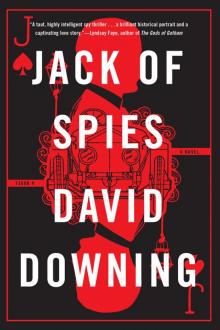 Jack of Spies
Jack of Spies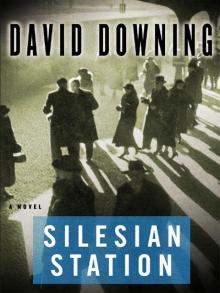 Silesian Station (2008)
Silesian Station (2008) The Moscow Option
The Moscow Option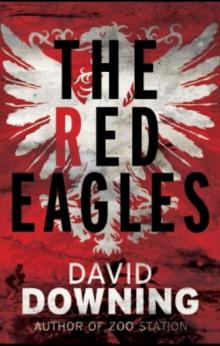 The Red Eagles
The Red Eagles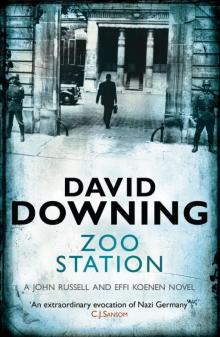 Zoo Station
Zoo Station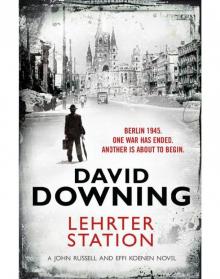 Lehrter Station
Lehrter Station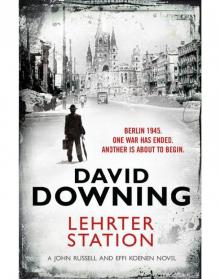 Lehrter Station jr-5
Lehrter Station jr-5